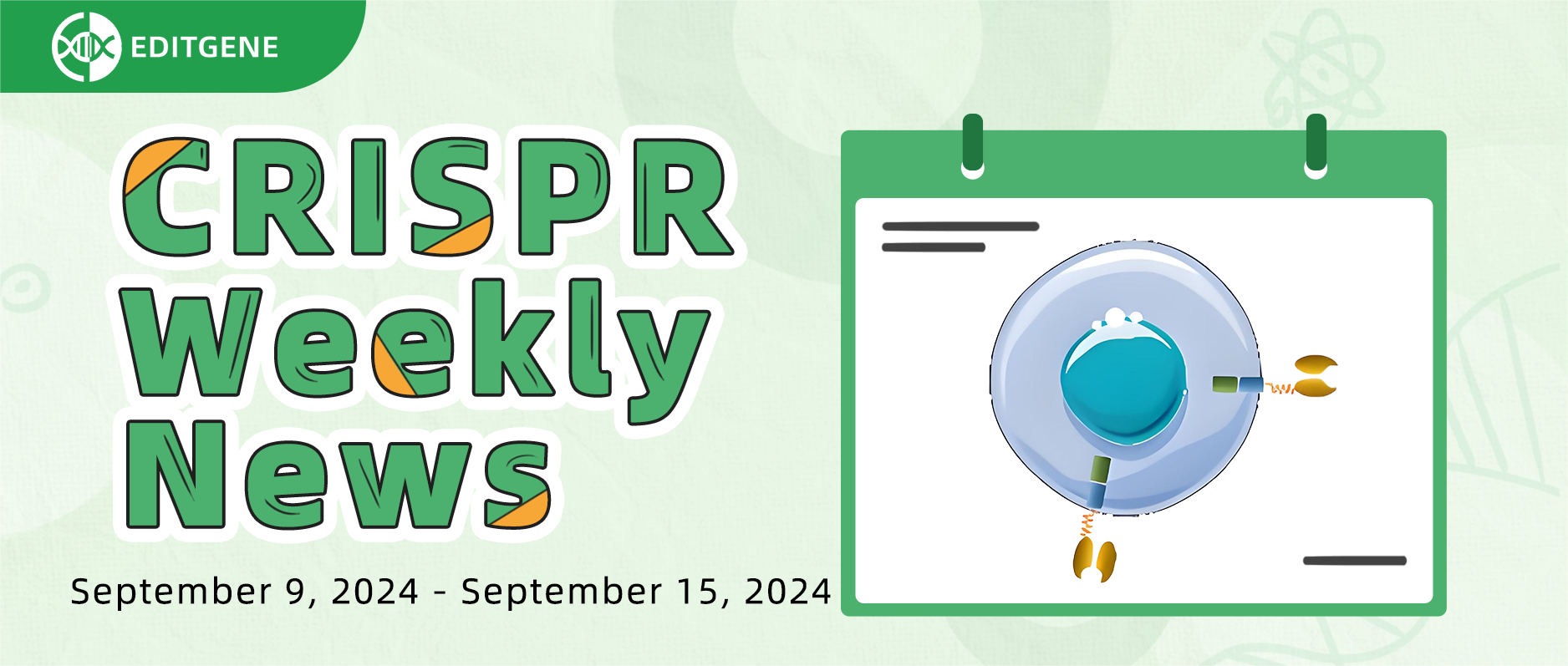[Weekly News] CRISPR screening reveals new mechanism: IL-4 contributes to CD8+ CART cell failure

CRISPR/Cas technology is a revolutionary tool in modern biological sciences, with applications spanning medicine, agriculture, environmental conservation, and more. New findings and case studies continue to emerge across these fields. Our "CRISPR Weekly News" column brings you the latest research and industry updates. Here's a brief summary of the past week's highlights:
I.Research Updates
i CRISPR Screening
1.Title: IL-4 drives exhaustion of CD8+ CART cells
Journal: Nature Communications (Impact Factor: 14.7)
Original Link: https://doi.org/10.1038/s41467-024-51978-3
The durable response of chimeric antigen receptor T (CAR-T) cell therapy remains limited, partly due to CAR-T cell exhaustion. A group of researchers in the U.S. conducted a study using whole-genome CRISPR knockout screening, RNA sequencing, and ATAC sequencing to further understand the regulatory mechanisms of cell exhaustion. Their results indicate that Interleukin-4 (IL-4) is a key factor driving CAR-T cell exhaustion, limiting the effectiveness of CAR-T cell therapies. However, they also suggest that blocking IL-4 or its pathway can enhance CAR-T cell performance and antitumor efficacy in mouse models.
2.Title: Neonatal Fc receptor is a functional receptor for classical human astrovirus
Journal: Genes to Cells (Impact Factor: 1.3)
Original Link: https://doi.org/10.1111/gtc.13160
Human astrovirus (HAstV) is a major cause of gastroenteritis worldwide. However, the molecular mechanisms controlling its susceptibility remain unclear, partly because the functional receptor used by the virus has not been identified. Researchers from Japan conducted a whole-genome CRISPR-Cas9 screening and identified the neonatal Fc receptor (FcRn) as the functional receptor for classical HAstV. They discovered that the absence of FcRn prevents infection in cells and organoids, while its expression allows the virus to enter non-susceptible cells by directly binding to the HAstV spike protein. These findings may offer new insights for developing targeted therapies against gastroenteritis.
3.Title: Kinesin-7 CENP-E mediates centrosome organization and spindle assembly to regulate chromosome alignment and genome stability
Journal: Cell Proliferation (Impact Factor: 5.9)
Original Link: https://doi.org/10.1111/cpr.13745
CENP-E, a kinesin-7 motor protein, plays a critical role in chromosome alignment during mitosis. Researchers from Fujian Medical University demonstrated through CRISPR-Cas9 knockout studies that the absence of CENP-E leads to chromosome congression defects, aneuploidy, and disorganized spindle assembly. CENP-E deficiency also impacts kinetochore protein localization, activates the spindle assembly checkpoint, and affects cell division in vivo. These findings provide new insights into the function and molecular basis of CENP-E in chromosome alignment and cell cycle progression during mitosis.
ii. CRISPR Knockout
1. Title: Correction of exon 2, exon 2-9 and exons 8-9 duplications in DMD patient myogenic cells by a single CRISPR/Cas9 system
Journal: Scientific Reports (Impact Factor: 3.8)
Original Link: https://doi.org/10.1038/s41598-024-70075-5
Researchers from France reported the correction of three duplications in the dystrophin gene in Duchenne muscular dystrophy (DMD) patient cells using CRISPR-Cas9 gene editing and a single guide RNA. Their findings highlight the potential of CRISPR-Cas9 to correct exon duplications in DMD, a mutation type that is not addressed by any of the four approved exon-skipping therapies.
2. Title: Prevention of Prostate Cancer Metastasis by a CRISPR-delivering Nanoplatform for Interleukin-30 Genome Editing
Journal: Molecular Therapy (Impact Factor: 12.1)
Original Link: https://doi.org/10.1016/j.ymthe.2024.09.011
Researchers from Italy have developed a novel nanoparticle platform for IL-30 knockout as a new therapeutic strategy for metastatic prostate cancer. Using lipid nanoparticles carrying CRISPR-Cas9 and gRNA targeting the human IL-30 gene, the team observed effective gene knockout both in vitro and in vivo. Following intravenous injection into mice, the functionalized nanoparticles demonstrated circulation stability, efficient IL-30 gene editing, and inhibition of lung metastasis in mice carrying circulating prostate cancer cells and micrometastases, without significant off-target effects or organ toxicity during the study.
iii. CRISPR Detection
1. Title: Synergistic effect of split DNA activators of Cas12a with exon-unwinding and induced targeting effect
Journal: Nucleic Acids Research (Impact Factor: 16.6)
Original Link: https://doi.org/10.1093/nar/gkae766
Although Cas12a is widely used in genome editing and molecular diagnostics, the activation mechanism behind its trans-cleavage activity, especially in the case of split DNA activators, remains poorly understood. Recently, researchers from Wenzhou Medical University have elucidated the synergistic effects of these activators and introduced the concepts of exon-unwinding and induced targeting effects to describe the phenomenon. They demonstrated that when the split DNA activators adjacent to the PAM site bind with Cas12a ribonucleoproteins (Cas12a-RNPs), a ternary complex is formed that captures distal cleaved DNA activators and interacts with them to achieve synergistic effects.
II. Industry News
1. ArsenalBio recently announced in a press release that it has raised $325 million in an oversubscribed Series C financing round to advance its pipeline of programmable cell therapy programs through clinical development. Earlier this year, the company reported that the first patient was dosed in a Phase 1/2 clinical trial of AB-2100, a therapy being developed for the treatment of clear cell renal cell carcinoma. AB-2100 utilizes ArsenalBio’s CRISPR-enabled transgene integration via electroporation (CITE) technology to engineer T cells to selectively target tumor cells and overcome the suppressive tumor microenvironment.
2. Excision Biotherapeutics recently announced that it will present data from its hepatitis B virus (HBV) EBT-107 program at the 2024 International HBV Meeting, which will be held from September 11-15 in Chicago. EBT-107 is a CRISPR-based gene therapy being developed as a potential cure for HBV. EBT-107 utilizes dual gRNAs to effectively inactivate the virus and prevent the emergence of escape variants.
3. Fate Therapeutics announced in a press release that it will present data at the 2024 Cantor Global Healthcare Conference. While specific details of the presentation have not yet been disclosed, a live webcast of the presentation will be available in the "Events and Presentations" section of the company’s website if recorded.
EDITGENE focuses on CRISPR technology, offering a range of high-quality gene editing services and in vitro diagnostic products.
These include but are not limited to: CRISPR Library Screening, Cell Line Engineering, Monoclonal Cell Line Screening, CRISPR Detection.
We are committed to providing the most efficient technical services for CRISPR-related, gene function research, in vitro diagnostics, and therapeutic research.
Recent Blogs:
Follow us on social media
Contact us
+ 833-226-3234 (USA Toll-free)
+1-224-345-1927 (USA)
info@editxor.com















![[Literature Review] A “Gene Scalpel” Emerges: A New Hope for Tay-Sachs Disease Cure](/uploads/20250527/bL2GJjteMDvzmZys_53c82bdd67704fe0e159246934f924ee.png)

Comment (4)